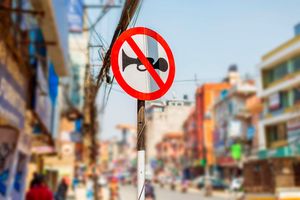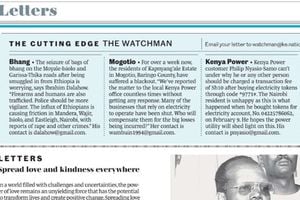
Magic bullet theory suggests that people are easily influenced or swayed by media messages.
Clifford Watene, regular reader of editorials, questions the impact of these pieces, asking why the Nation bothers to write them if they “don’t seem to change anything”.
He cites the editorial titled “Dear Linturi, do the noble thing and quit” (April 13, 2024), which called for the resignation of Agriculture Cabinet Secretary Mithika Linturi over the fake fertiliser scandal, yet he has not resigned or been forced to resign.
Mr Watene cites several other recent editorials that have called for action but no action has been taken.
However, it’s important to note that editorials serve multiple purposes beyond calling for action, including influencing public opinion, setting the public agenda, and stimulating public discussion.
The degree of influence may vary, depending on factors such as the persuasiveness of the argument and the reader’s existing beliefs and values.
Watene’s scepticism challenges an old mass media communication theory that assumes the media is all-powerful and controlling. The theory is from the 1920s and ’30s, when newspapers and radio were the only mass media sources of information.
The theory is called the magic bullet theory or hypodermic needle theory. It suggests that people are easily influenced or swayed by media messages.
The magic bullet theory, as one communication scholar explains, assumes that the media’s message is a bullet fired from the “media gun” into the reader’s or viewer’s “head”. The hypodermic needle theory uses the same “shooting” analogy; a (brainwashing) substance is injected into our blood stream.
The theory suggests we are passive recipients of media messages and their effects are immediate, direct and uniformly the same for all of us. The theory, perhaps, gives credence to the old Kenyan dictum: “It’s true; I heard it over the radio” or “It’s true; it’s reported in the newspapers”.
In fact, several episodes in our history seem to confirm the validity of the theory. Senior Chief Njiiri is said to have smashed his radio in 1961 following a news bulletin that said Jomo Kenyatta, who had been detained, was going to be released. The same radio had a year earlier said that Kenyatta had left Kikuyuland never to return.
The colonial paramount chief was so infuriated by the ‘lying’ radio that he took an axe—some say a spear—and smashed the gadget into smithereens. “This thing told us that us Kenyatta would be detained and never come back alive, and now it’s again telling us that Kenyatta is going to be released!” he yelled in Kikuyu.
This episode both confirms and disowns the theory.
The repeal of Section 2A of the old Constitution in 1991, which made Kenya a multi-party state, was a direct result of sustained political agitation amply covered in the media. The campaign thoroughly discredited the Kanu single-party rule. President Daniel arap Moi was forced to allow the repealing of the offensive law.
The 2022 presidential election, however, challenges the theory. Raila Odinga, who received the lion’s share of favourable media coverage, lost to the underdog, Dr William Ruto. This seems to suggest that when the public feels strongly about an issue, the magic bullet theory does not work.
But the theory seems to prevail on many issues. The ongoing parliamentary petition seeking to ban TikTok is the result of the perceived influence of the media on our moral and cultural norms. TikTok messages are seen as the magic bullet being fired at our heads or as the substance that is being injected into our bloodstream to change or corrupt our culture.
However, the theory overlooks the complexity of media communication and the role of audience interpretation of media messages. While the media can influence people, its effectiveness is contingent on several factors, suggesting a more nuanced understanding of media communication effects. Only in rare occasions, especially when an issue is highly sensitive or emotive, does the magic bullet theory have a significant and direct impact on audience behaviour.
Social scientists have also come up with several other theories that provide a more nuanced understanding of media influence. They include the uses and gratifications theory, which suggests that individuals actively seek out media that fulfils their needs and interests.
The magic bullet theory is, indeed, a relic of a bygone era. It may be more of a myth than reality in modern Kenya, where citizens are exposed to a multiplicity of media platforms, including digital and social media.
- The Public Editor is an independent news ombudsman who handles readers’ complaints on editorial matters including accuracy and journalistic standards. Email: [email protected]. Call or text 0721989264.










